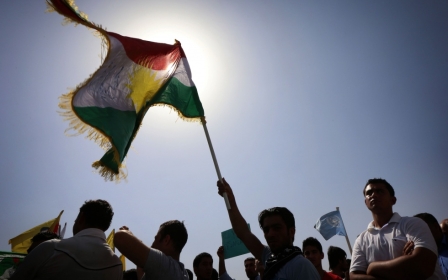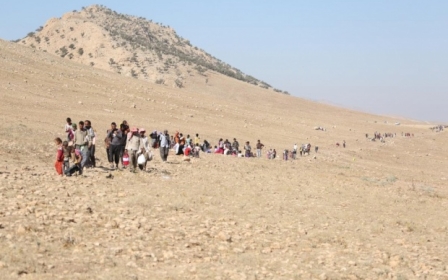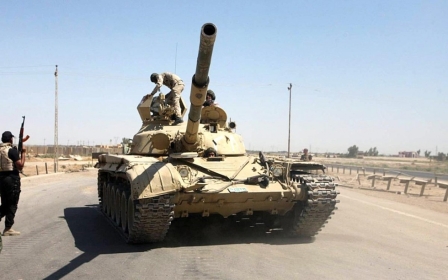Car bombs in Baghdad kill 44, injure 75

Forty-four people were killed and 75 others injured after a series of car bombs struck the Iraqi capital of Baghdad on Sunday, BBC Arabic reported.
A number of those injured were Shia pilgrims visiting Iraq to mark the religious festival of Ashura.
In a separate incident, the Islamic State (IS) group carried out a wave of mass killings, officials said on Sunday, executing more than 300 members of an Iraqi tribe which took up arms against the jihadists.
Women and children were said to be among the scores of members of the Albu Nimr tribe executed over the past 10 days in western Iraq's Anbar province.
Reports of the killings came with Iraq on edge as hundreds of thousands of Shiites prepare to travel to the city of Karbala this week for their annual pilgrimage.
The executions in Anbar came after members of the Sunni Albu Nimr tribe took up arms against IS in the province, large parts of which have been overrun by the group.
Accounts varied as to the number of people killed and timings of the executions, but a statement from Iraq’s Ministry for Human Rights said IS had killed a total of 322 people from the Sunni tribe.
The killings are likely aimed at discouraging resistance from powerful local tribes in Anbar.
Pro-government forces have suffered a string of setbacks in Anbar in recent weeks.
That has prompted warnings that the province, which stretches from the borders with Jordan and Saudi Arabia to the western approach to Baghdad, could fall entirely.
Iraqi security forces, who wilted in the face of an IS offensive earlier this year, are fighting to take back territory seized by the jihadists in the country's Sunni Arab heartland.
IS has declared an Islamic "caliphate" in the territory under its control, imposed its harsh interpretation of sharia law and committed widespread atrocities.
Bomb blast targets Shiites
Like other Sunni extremist groups IS, who may have been behind the bomb blasts, considers Shiites to be heretics and frequently attacks them, posing a major threat to the Ashura religious commemorations, which peak on Tuesday.
The pilgrimage is a major test for a new government headed by Prime Minister Haidar al-Abadi and for Iraq's security forces.
On the Syria-Turkey border, some 150 Iraqi peshmerga fighters were meanwhile preparing to join fellow Kurds in the battle against IS for the town of Kobane, after crossing the frontier late on Friday.
Syrian Kurdish militia have been holding off an IS offensive on Kobane for more than six weeks and the town has become a crucial symbol in the fight against the jihadists.
The Syrian Observatory for Human Rights, a Britain-based monitor, said clashes were taking place in the south of the town and Kurdish fighters were shelling IS positions to its east.
The US-led coalition that has launched air raids against IS in Syria and Iraq carried out at least three strikes near Kobane early Sunday, said the Observatory, which relies on a wide network of sources inside the country.
At least 11 jihadists were killed in air strikes and fighting on Saturday, it said.
Heritage sites destroyed
UNESCO chief Irina Bokova on Sunday slammed the "barbaric" destruction of Iraq's cultural heritage, as militants from the Islamic State group destroy age-old sites in areas they control.
Iraq has "thousands of temples, of buildings, of archaeological sites, of objects, that represent a treasure for (all) humanity," Bokova said during a visit to Baghdad.
"We cannot agree that this treasure, that this legacy of human civilisation, is being destroyed in the most barbaric matter," she said.
"We have to act, we don't have time to lose, because extremists are trying to erase the identity, because they know that if there is no identity, there is no memory, there is no history, and we think this is appalling and this is not acceptable."
The Islamic State jihadist group spearheaded a sweeping militant offensive that has overrun much of the country, and has proceeded to destroy sites it considers idolatrous or heretical.
The extremist group has destroyed shrines, churches and precious manuscripts in Mosul, Tikrit and other areas of Iraq it controls and excavated sites to sell objects abroad, in what Bokova has previously described as "cultural cleansing".
New MEE newsletter: Jerusalem Dispatch
Sign up to get the latest insights and analysis on Israel-Palestine, alongside Turkey Unpacked and other MEE newsletters
Middle East Eye delivers independent and unrivalled coverage and analysis of the Middle East, North Africa and beyond. To learn more about republishing this content and the associated fees, please fill out this form. More about MEE can be found here.




